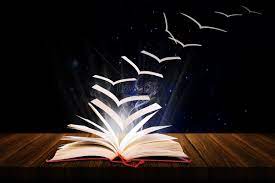When I was younger, I was subjected to my father’s performances of what he liked to call “reading aloud”. Through his often silly oral renditions, I grew up with the idea that reading was something to enjoy. It was my first exposure to the world of words, gorgeous creatures that fly like flocks off of the pages and settle on the branches of the readers’ minds. Like a biologist might be curious about the flight patterns of the pigeon, a few years later I became curious about the inter-workings of this flight and fester perfected by word. My love for reading was a bottomless cavern, where I learned that I could consume words then scrape at the jewels within them, pulling them out to examine and use later. That was when I became curious about creating, nurturing my own flocks to then have them fly off. I came to college to mostly expand my curiosity and my ability to ask questions, to study the flight path of words and to learn how best to examine the mined jewels.
So far, I believe that literature is not one defined thing but a collection of various types of written and oral word, evolving like a flock to new environments and needs. Trying to fit things into a box, especially something so up to interpretation, creates unenviable spillage and a mess. I believe that, instead of trying to define what literature is and getting so caught up in the little details, questioning and thinking critically about everything you read is far more important and worthwhile. Like with our current discussions of fairy tales, whether they are literature or not isn’t as important to me as exploring my curiosity of their inter-workings all while enjoying a set of fun tales.


Dylan, I adore the figurative language in your post. The imagery of words “settling on branches” of readers’ minds is so cool, and I like how your image connects to it. I relate to the picture you paint with that metaphor, because I find myself getting words stuck in my head like songs, and I either repeat them to myself or find some way to stick them into my writing to satisfy a craving of sorts. I like how you carried this metaphor through your entire post, returning to it in a way that makes it stick with the reader. It works so well with your definition of literature being an ever-evolving concept. I agree that it’s best not to get carried away with the definitions of literature, especially when it comes to reading for pleasure. It’s important to examine literary concepts and its place in culture, but like you said, this can and should be applied to anything we read, instead of stopping to figure out if something is literature or not based on the definitions of others.
Dylan, your notion of books as birds is very cool. I also like that you were able to find an image that fit with that idea. You have a way with making books and stories seem alive and almost magical.
My parents read so many bedtime stories to me as a child, so I can relate to the experience of learning to love words through oral tales. I also have memories of my grandma telling me stories about her pet dog, Bennett, and I remember being so obessed with the idea of storytelling that I would ask her to tell the same Bennett stories over and over again! It’s funny how telling stories to kids can have such a strong, positive impact on them.
At the end, it’s wonderful how you’re not necessarily concerned with whether fairy tales are literature or not, and would prefer to just focus on the content of them and enjoy reading them. That’s such a good approach to have, because one is able to look at things with more of an open mind if they are not constantly focused on preconceived notions of what constitutes literature.
I hope that you are able to learn a lot about the flight paths of fairy tales in this class.